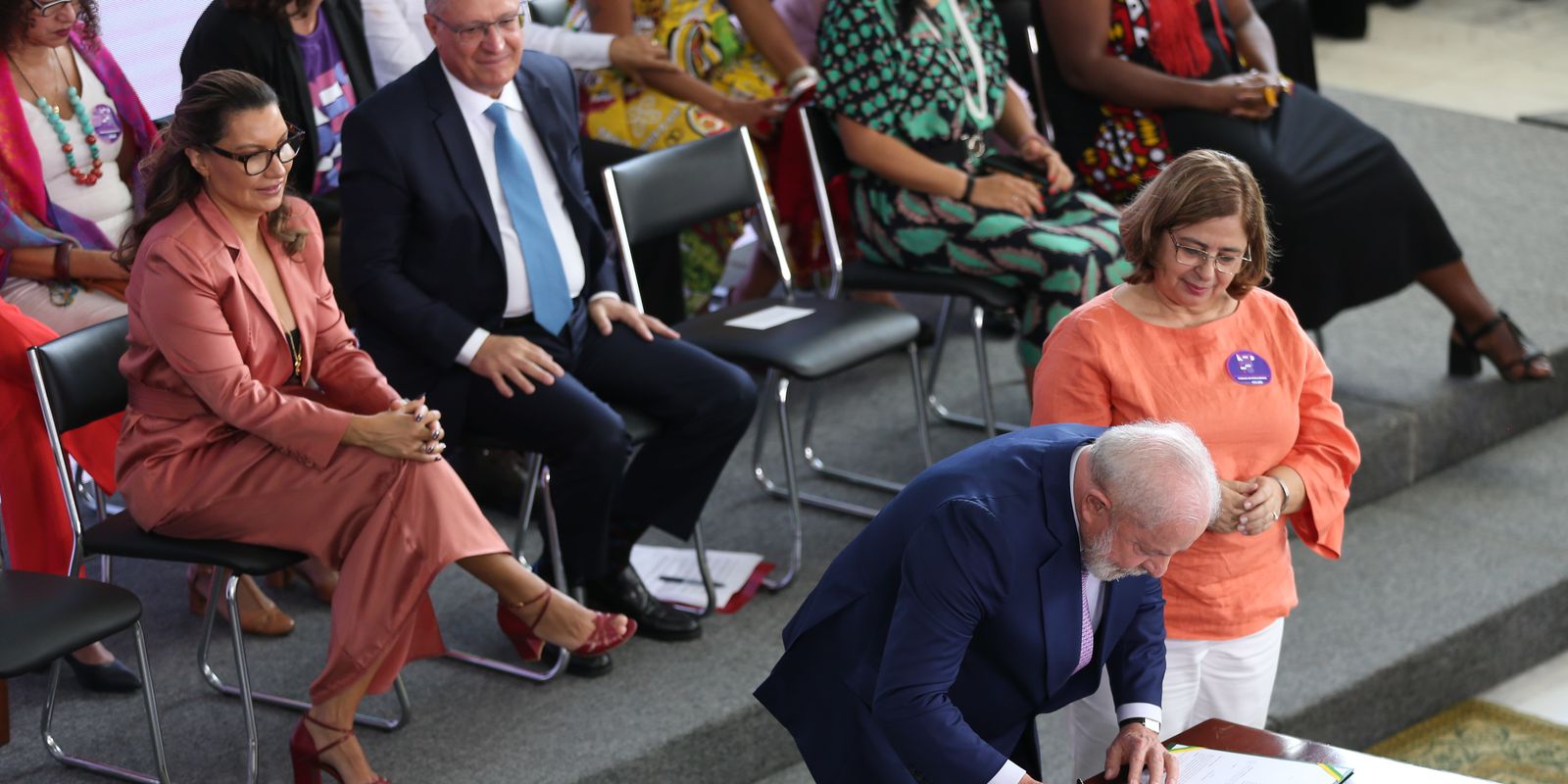Employers who pay differentiated salaries to a woman who has the same length of service, the same function and with similar education as a male employee will be fined 10 times the value of the highest salary paid in the company. This is what appears in the bill on equal pay signed this Wednesday (8) by President Luiz Inácio Lula da Silva and sent to the National Congress for analysis.
The text provides for the obligation of companies that have more than 20 employees to provide transparency to salary ranges to give inspection capacity to the Ministry of Labor. The folder should also draw up an inspection protocol for these cases.
The Minister of Planning and Budget, Simone Tebet, explained that, “in blatant cases of discrimination”, a competent judge may, on a preliminary basis, determine that the woman receives the same salary as the man in the month of the complaint of inequality.
Regarding the possibility of these measures resulting in a reduction in the hiring of women, Tebet stated that this is a misogynistic discourse (of hatred or aversion to women) by productive sectors.
“If any employer is discriminating against a woman, if that is a factor for him not to hire a woman, there will be no lack of serious, responsible and committed companies for this”, he said.
“We are essential in the labor market, not only in the care sector, not only as nurses, as teachers or in the clothing industry, today we are essential in the labor market because if women are not hired, they will have difficulties in their production”, said Tebet after a ceremony celebrating International Women’s Day at the Planalto Palace.
Tebet pointed out that the measure will still be debated by parliamentarians, but recalled that a similar text has already been approved. In 2021, under the management of Jair Bolsonaro, the Palácio do Planalto returned to the National Congress a bill, which was ready for sanction, and increased the fine in the amount corresponding to five times the salary difference paid by the employer. The project has since stalled in the Chamber of Deputies.
historical violence
For President Luiz Inácio Lula da Silva, by accepting that women earn less than men performing the same function, historical violence against women is perpetuated. “It is important to remember that in this bill there is a word that makes the difference from everything that has already been written about equal work between men and women. And that magic word is ‘obligation’ to pay the same salary. There will be a lot of people who won’t want to pay, but for that, Justice has to work to force the businessman who doesn’t pay, pay what the woman deserves for her ability to work “, he said.
During her speech, the Minister of Women, Cida Gonçalves, cited a study by the International Labor Organization (ILO), which points out that equal pay between men and women can add 0.2% to the growth rate of the Gross Domestic Product (GDP, sum of goods and services produced in the country) of a country. “We are working hard to make this happen”, she said, noting that the Wage inequality in Brazil reaches 30%even women with a higher educational level.
Misogyny
At the celebration at the Planalto Palace, President Lula announced a series of federal government actions that directly affect the fight against violence and the guarantee of women’s rights. For him, the respect for women is a non-negotiable value.
“There was a time when March 8 was celebrated with the distribution of flowers, while the other 364 days were marked by discrimination, machismo and violence. Today, we are celebrating March 8th with the respect women demand. Respect in all the spaces they want to occupy, whether at work, in public places, in politics or inside their own homes”, said Lula.
Citing the set of announced measures, Minister Cida Gonçalves proposed a social pact to confront misogyny and violence against women.
“It is essential that the government play its role, but it is necessary to go further and continue advancing in understanding that contempt and hatred of women cannot be naturalized. We cannot accept the fact that men make money on the internet practicing misogyny, and this needs to stop. This environment makes us return to statistics that are so repeated, but still so shocking: every day three women are killed in Brazil for being women. Combating femicide is an urgent political struggle,” he said.
It is public knowledge that there are masculinist groups who propagate misogyny and threaten women on the internet. One of them, the RedPill movement, uses the supposed self-help discourse in relationships to propagate sexism and misogyny.
In this context of combating violence, the minister announced the recreation of the Mulher Viver sem Violência program, with the implementation of 40 units of the Brazilian Women’s House, with resources from the National Public Security Fund and an investment of R$ 372 million. The program also provides for the donation of 270 vehicles to the Maria da Penha Patrol, in all states.
Call 180, the Women’s Service Center, is also being rebuilt. In the previous administration, this system was integrated with Dial 100 and the National Human Rights Ombudsman. On this phone, it is possible to file complaints against any type of gender violence, with a free call from anywhere in the country. The service operates 24 hours a day.
Check out the actions announced by the federal government this March 8
female labor
Decree providing for the regulation of the quota of 8% of the workforce for women victims of violence in public contracts in the direct federal administration, autarchies and foundations.
A policy to combat sexual and moral harassment and discrimination in the federal public administration will also be launched.
political violence
Bill for transforming March 14 into National Marielle Franco Day, a date focused on combating gender and racial political violence. This date marks the day the Rio de Janeiro councilwoman was murdered, in 2018.
menstrual dignity
Decree dealing with menstrual dignity, with the commitment to distribute sanitary pads free of charge in the Unified Health System (SUS). Additionally, a gender and race equity program will be launched among SUS servers.
international actions
The federal government will ratify the ILO Convention 190, the first international treaty to recognize the right of all people to a world of work free from violence and harassment, including gender-based violence. Among other measures, Convention 190 expands concepts of sexual and moral harassment at work.
The country is going to join the International Coalition for Equal Pay, which involves entities such as the ILO, UN Women and the Organization for Economic Cooperation and Development (OECD).
education and sport
Resumption of work on 1,189 day care centers that had been halted.
Over the next two years, vacancies in professional and technological education courses and programs will also be guaranteed for 20,000 women in vulnerable situations.
Signing of a decree that determines maternity leave for Bolsa Atleta members. The intention is to guarantee respect, in a broad way, for maternity and pregnant women. The text guarantees the regular receipt of program installments aimed at high-performance athletes until the beneficiary can start or resume sports activity.
Culture
Ruth de Souza de Audiovisual Public Notice, which will support unpublished projects by Brazilian filmmakers to make their first feature film. There are R$ 10 million in investments.
Another line of action is to encourage literature, with R$ 2 million in the Carolina Maria de Jesus Award, for unpublished books written by women.
science and research
Establish the National Policy for Inclusion, Permanence and Ascension of Girls and Women in Science, Technology and Innovation. It is estimated that there will be a CNPq public call for R$ 100 million, aimed at women in the exact sciences, engineering and computing.
Financial autonomy
Launch of a public notice for rural technical assistance for rural women, through the Economic Productive Organization of Rural Women program, with an investment of R$ 50 million and the prospect of serving up to 20,000 women.
Banco do Brasil announced that five Agro Mulher carts will travel the country offering differentiated credit for women, financial services and training for individuals and companies.
Caixa Econômica Federal will promote Mulheres na Favela, with the qualification of women in three social innovation laboratories in Rio de Janeiro, São Paulo and Salvador.
The BNDES will emphasize the Garage Project, with acceleration of startups led by women.
working groups
Creation of inter-ministerial working groups focused on guaranteeing women’s rights. One of them will focus on the elaboration of a National Care Policy, another will formulate the National Plan for Equal Salary, Remuneration and Labor between Women and Men and a third will have as its goal the Policy to Combat Moral and Sexual Harassment and Discrimination in the Administration Public.
Working Groups to Combat Political Violence based on Gender and Race and another to formulate the National Policy for the Inclusion, Permanence and Promotion of Girls in Science, Technology and Innovation. Lectures, events, seminars and debates are scheduled for the entire month in various ministries.
collegiate
The General Secretariat of the Presidency of the Republic determined that female representation in councils and commissions linked to the portfolio should be at least 50% of its composition. Gender parity was defined in ordinance published this Tuesday (7) in the Official Diary of the Union. The text also establishes that at least 20% of the seats on the collegiate bodies will have to be occupied by self-declared black and brown people.
According to the ordinance, civil society organizations may nominate the same person as a representative on up to two councils or commissions, and nominees will be entitled to up to two consecutive or three alternate terms.
The collegiate bodies linked to the General Secretariat are the National Council for Food and Nutritional Security; Council for Social Participation; National Youth Council; National Council for Promotion and Collaboration; National Commission of Agroecology and Organic Production; and National Commission for the Sustainable Development Goals.















